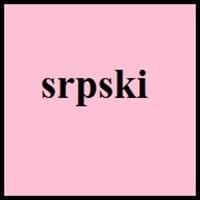Countries
Algeria, Bahrain, Chad, Comoros, Djibouti, Egypt, Eritrea, Iraq, Israel, Jordan, Kuwait, Lebanon, Libya, Mauritania, Morocco, Oman, Qatar, Saudi Arabia, Somalia, Sudan, Tunisia, United Arab Emirates, Yemen
Bosnia and Herzegovina, Kosovo, Serbia, Slovakia
National Language
Algeria, Bahrain, Comoros, Djibouti, Egypt, Jordan, Kuwait, Lebanon, Libya, Mauritania, Morocco, Oman, Palestine, Qatar, Saudi Arabia, Somalia, Sudan, Syria, United Arab Emirates, Yemen
Bosnia, Croatia, Montenegro, Serbia
Second Language
Not spoken in any of the countries
Not spoken in any of the countries
Speaking Continents
Africa, Asia
Europe
Minority Language
Not spoken in any of the countries
Croatia, Czech Republic, Hungary, Macedonia, Montenegro, Romania, Slovakia
Regulated By
Academy of the Arabic Language, Arabic Language International Council
Board for Standardization of the Serbian Language
Interesting Facts
- Arabic is 5th common language in world.
- Classical Arabic is the language of Quran and also it is official language. Classical Arabic is the only way to learn Arabic language in academic way and it does not change.
- Serbian language was derived from the Old Church Salvic, as the language was commonly spoken by most of Slavic people in the 9th Century.
- Serbian language is based on Stokavian dialect.
Similar To
Amharic and Hebrew
Bosnian and Croatian Languages
Derived From
Not Available
Not Available
Alphabets in
Arabic.jpg#200
Serbian-Alphabets.jpg#200
Scripts
Arabic
Cyrillic, Latin
Writing Direction
Right-To-Left, Horizontal
Left-To-Right, Horizontal
Hello
مرحبا
Здраво (Zdravo)
Thank You
شكرا
Хвала лепо (Hvala lepo)
How Are You?
كيف حالك؟
Како си? (Kako si?)
Good Night
تصبح على خير
Лаку ноћ (Laku noć)
Good Evening
مساء الخير
Добро вече (Dobro veče)
Good Afternoon
مساء الخير
Добар дан (Dobar dan)
Good Morning
صباح الخير
Добро јутро (Dobro jutro)
Please
من فضلك
Молим (Molim)
Sorry
آسف
Жао ми је (Žao mi je)
Bye
وداعا
Довиђења (Doviđenja)
I Love You
أحبك
Волим те (Volim te)
Excuse Me
اعذرني
Извините (Izvinite)
Dialect 1
Maghrebi
Prizren-Timok
Where They Speak
Algeria, Libya, Maghreb, Morocco, Tunisia
Southeastern Serbia
Dialect 2
Sudanese
Smederevo–Vršac
Where They Speak
Sudan
Serbia
How Many People Speak
Not Available
Dialect 3
Levantine
Torlakian
Where They Speak
Cyprus, Levant
Bulgaria, France, Kosovo, Macedonia, Romania, Serbia
Speaking Population
Not Available
Second Language Speakers
Not Available
Native Name
(al arabiya) العربية
српски (srpski) српски језик (srpski jezik)
Alternative Names
Al-’Arabiyya, Al-Fusha, Literary Arabic
Montenegrin
German Name
Arabisch
Serbisch
Pronunciation
/al ʕarabijja/, /ʕarabi/
[sr̩̂pskiː]
Origin
512 CE
11th Century
Language Family
Afro-Asiatic Family, Semitic Family
Indo-European Family
Subgroup
Semitic
Not Available
Branch
North Arabic
Not Available
Early Forms
No early forms
No early forms
Standard Forms
Modern Standard Arabic
Standard Serbian
Signed Forms
Signed Arabic
Not Available
Scope
Macrolanguage
Individual
ISO 639 6
Not Available
Not Available
Glottocode
arab1395
serb1264
Linguasphere
12-AAC
53-AAA-g
Language Type
Living
Living
Language Linguistic Typology
Subject-Verb-Object
Subject-Verb-Object
Language Morphological Typology
Fusional, Synthetic
Not Available
Arabic and Serbian Greetings
People around the world use different languages to interact with each other. Even if we cannot communicate fluently in any language, it will always be beneficial to know about some of the common greetings or phrases from that language. This is where Arabic and Serbian greetings helps you to understand basic phrases in Arabic and Serbian language. Arabic word for "Hello" is مرحبا or Serbian word for "Thank You" is Хвала лепо (Hvala lepo). Find more of such common Arabic Greetings and Serbian Greetings. These greetings will help you to be more confident when conversing with natives that speak these languages.
Arabic vs Serbian Difficulty
The Arabic vs Serbian difficulty level basically depends on the number of Arabic Alphabets and Serbian Alphabets. Also the number of vowels and consonants in the language plays an important role in deciding the difficulty level of that language. The important points to be considered when we compare Arabic and Serbian are the origin, speaking countries, language family, different greetings, speaking population of these languages. Want to know in Arabic and Serbian, which language is harder to learn? Time required to learn Arabic is 88 weeks while to learn Serbian time required is 44 weeks.





